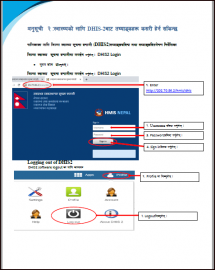Breakthrough ACTION Nepal
Systems Strengthening
From 2018-2020, Breakthrough ACTION is implementing a USAID-funded social and behavior change (SBC) systems strengthening project in collaboration with the National Health Education Information and Communication Center (NHEICC) and Family Welfare Division (FWD).
The project assessed SBC capacity at the federal, provincial (Karnali Province) and project municipalities in Jumla and Surkhet. Based on the assessment findings, CCP worked closely with NHEICC, Karnali Ministry of Social Development (MoSD), Karnali Health Directorate (HD), and municipality elected representatives (executive committee) and health staff to address SBC capacity gaps through trainings, mentoring, practical, learning by doing activities.
SBC Palika (Municipality) Package
The SBC Palika (municipality) package was simultaneously conceptualized, designed, field-tested and developed. The package is a job aid for municipality level personnel and stakeholders to plan, use and monitor SBC locally. The consolidated SBC Palika package has been reviewed extensively locally and provincially by stakeholders at the federal level. The project is now in the process of creating and testing a digital version of the SBC Palika package for easier access and use by 753 municipalities across Nepal.
Local Systems Strengthening to Reduce Child, Early, and Forced Marriage (CEFM)
This activity aims to strengthen the institutional and technical capacity of the Government of Nepal to design, implement, evaluate and coordinate effective programs to reduce CEFM in Province 2. Breakthrough ACTION is a partnership of Johns Hopkins Center for Communication Programs and SAVE the Children. This 3-year, $2.4 Million activity will work closely with the Ministry of Women, Children and Senior Citizens (MWCSC), Province 2, and select local-level government and non-government structures to ensure synergy and maximize impact. CEFM is a complex issue requiring an integrated, cross-sectoral approach at all administrative levels and across Education, Child Welfare, Health, Gender Equity/Social Inclusion (GESI), and Democracy and Governance (linking with Law Enforcement).
Source: Johns Hopkins Center for Communication Programs
Date of Publication: August 6, 2020
SIMILIAR RESOURCES
Tools
Examples
- Using Data to Design an Evidence-based Social and Behavior Change Program in Rural Nepal
- Prioritizing and Targeting SBC Investments for Youth
- Lever les Tabous: La sexualité et les approches promouvant l’égalité des genres pour mettre fin aux unions et aux mariages d’enfants, précoces et forcés
- Entertainment-Education Curriculum
- Improving the Uptake and Adherence of Iron Folic Acid Supplements among Pregnant and Lactating Women
- Factors Impacting Use of Health Services by First-time/Young parents: A Formative Research Toolkit
- “Because my Husband and I Have Never Had a Baby Before…” Results and Lessons from Interventions with First-Time Parents in Madagascar, Mozambique, and Nigeria
- HIV and Sexual and Reproductive Health Programming: Innovative Approaches to Integrated Service Delivery
- What to Know About Kawasaki Disease, the Pediatric Inflammatory Condition Possibly Linked to COVID-19
- Global Strategy to Stop Health-Care Providers from Performing Female Genital Mutilation

